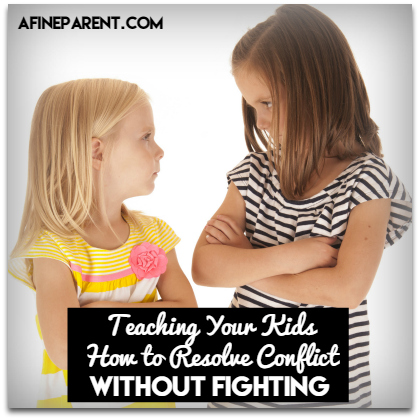 You know how we have epiphanies as we grow older?
You know how we have epiphanies as we grow older?
One of the most profound ones for me has been the realization that just because someone doesn’t agree with what you’re saying at the moment doesn’t mean that they don’t agree with you all the time or that they don’t like you anymore.
This simple realization has had a huge impact on my life.
Just recently, my parents and brother were in town for my daughter’s birthday. We were at dinner the night before her party, and my brother hadn’t put his phone down the entire half hour we’d been seated. I made a comment on this – that it’s not pleasant to share a meal with someone that can’t take their eyes away from their smart phones – and he stormed off, refusing to engage in any conversation.
This isn’t the first time he’s had a violent outburst of anger over a small conflict. As his family member, it upsets me that this happens so frequently.
While I tried to make amends over text message (the only way he was willing to communicate), I noticed something in what he was saying – he thought that any criticism of his actions was a criticism of him. He thought that if I respected him, then I would not say anything negative to him. And worst of all, he thought that disagreeing meant we couldn’t be friends.
I started to wonder why this might be. Did we not have good examples of conflict resolution growing up? Did we witness violent outbursts of anger? When I think back on it, I can’t remember my parents ever arguing. And while that may seem like a good thing, I think that may be where the problem lies.
In order to know how to handle conflict in a productive and healthy manner, we need models of healthy conflict resolution. While on one hand fighting and inflamed emotions only create pain, on the other, never seeing adults disagree means our children don’t know how to deal with conflicts at all.
Productive arguing and even conflict is good and can bring us closer when handled well. Among the many things we teach our kids, how to resolve conflict without resorting to either drama or fighting, or just simply sweeping it under the rug to fester, is very important.
Here are some ways we can teach our kids to argue in a way that builds connections, instead of destroying them:
1. Teach that disagreement and conflict do not mean that the relationship is damaged or in jeopardy
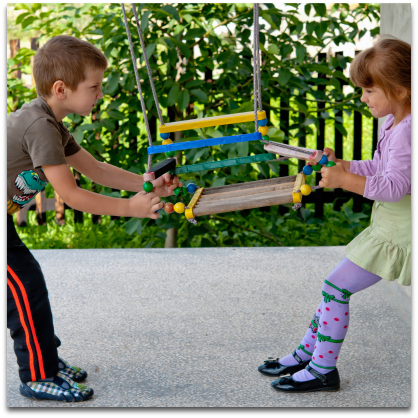 Our children need to know they are loved unconditionally. This is true in our homes, in school, and on the playground. It is far too common for individuals to view a disagreement as the undoing of a relationship. It is entirely possible to have opposing views and to still get along.
Our children need to know they are loved unconditionally. This is true in our homes, in school, and on the playground. It is far too common for individuals to view a disagreement as the undoing of a relationship. It is entirely possible to have opposing views and to still get along.
When your child comes home after a disagreement with a friend, listen to the grievances and remind your child that their relationship with their friend remains intact.
Saying “I see, you didn’t like it that Mila wouldn’t share the swing with you” places the burden on the action; saying “it sounds like Mila was being mean today” places the burden on Mila.
This important distinction does two things:
- it helps your child understand that it was the action, not the friend, which was truly upsetting and
- it promotes a growth mindset.
Your child will learn that Mila’s actions do not define her completely. If the negative feelings are linked directly to your child’s friend instead of the action, your child may incorporate that image of Mila as always being mean. By linking the feelings to the action, your child will be more likely to understand that having one disagreement does not mean that Mila will always be “mean”.
You can also teach your child this truth by affirming it whenever the two of you disagree. Be careful and intentional with the language you choose.
Instead of criticizing your child (“you’re being disruptive”), make it clear that it is the behavior that you are unapproving of (“the way you are banging your silverware on the table is disrupting our family dinner”).
This can help your child take an outside perspective of the behavior or disagreement. Instead of aligning him or herself with the behavior in opposition to you, he or she can align with you in opposition to the behavior. Which makes it easier to teach kids how to resolve conflict in a healthy manner and brings us to our next strategy…
2. Instill in your child a sense of family and friends as teammates
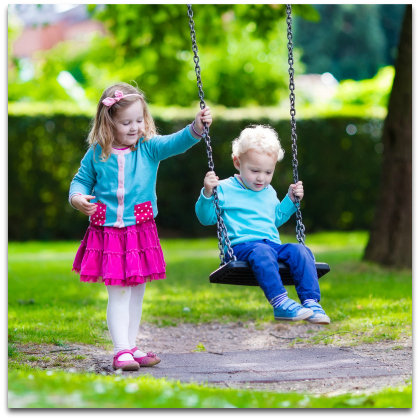 There’s nothing worse than feeling like you’re outside of a group. Being ostracized in time out or left out of a game of tag can be debilitating for a child. We want to belong. And one of the things that can make us feel like we don’t belong is having a fight.
There’s nothing worse than feeling like you’re outside of a group. Being ostracized in time out or left out of a game of tag can be debilitating for a child. We want to belong. And one of the things that can make us feel like we don’t belong is having a fight.
I noticed this in my communication with my brother. He felt rejected because of our disagreement, when in reality I only meant to point out a behavior that was hindering our ability to connect. I should have been more careful to make it clear that it wasn’t him that I had a problem with but the behavior instead.
One way we can do this with our children and other adults is reminding ourselves and each other that we are on the same team. When your child is disrupting dinner time, saying something like “we all want to have a meal together and spend time with each other” reminds him or her that you have the same goal.
Back to our example of Mila not sharing her swing – this is a good time to explain that individuals often have different ideas of the same goal. In this example, our goal on the playground is to have fun and play together. Mila is expressing this goal by swinging. How else can we meet this goal together? How can we cooperate, rather than compete, to find different options for reaching the same goal? Can we take turns with one on the swing and the other pushing her 10 times and then switch places so both of us can have fun?
This is the sort of conversation that may be difficult to have with young children, but if we are able to open our children’s minds to seeing different ways to get the same thing accomplished, and ultimately look for a win-win solution, we have done them a great service for their lives to come.
3. Encourage your child to recognize the emotions that come to the surface during a conflict
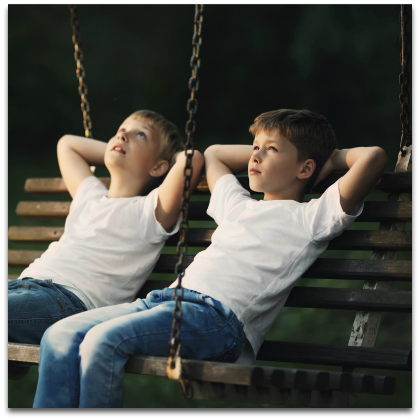 When we don’t view each other as teammates, we may come to assume that the other person has bad intentions or is trying to hurt us. Where does this come from?
When we don’t view each other as teammates, we may come to assume that the other person has bad intentions or is trying to hurt us. Where does this come from?
Most often, it is a defense against the pain and fear of being rejected. These emotions are quick to come to the surface in any conflict – our stomach gets tight, we sweat, our heart pounds. We are afraid of what the other person – our partner, a friend, a coworker – might say.
In order to protect ourselves against these scary feelings, we often fight back. We lash out instead of taking a moment to recognize our own vulnerability.
We can help our children recognize this cascade of thoughts and feelings by verbalizing it for them and asking them how they feel.
When you see anger rising in your child, place a hand on their shoulder and ask them what they’re feeling. The touch will help them feel safe and grounded, and the answer to your question may help them step out of their escalating anger and fear.
If they have trouble finding the words to describe their emotions, help them out. Say “it seems like you’re feeling angry/scared/frustrated”. Giving them a variety of words to express their emotions and helping them understand the more complicated ones will give them tools of emotional intelligence that they can use throughout their lives to build healthy relationships. This primer from The Natural Child Project has suggestions on how to observe and verbalize the emotions that arise from a difficult situation.
Once the emotions are identified, help them dig deeper to explore the causes of these emotions: “you felt frustrated when Mila wouldn’t share the swing with you”, or “did you feel scared that she may not be your friend if she didn’t share?”
By now, your child will probably start to be more calm and able to think through a healthy solution for how to resolve conflict. This is a good time to use our first two strategies: reminding your child that the disagreement does not mean that the friendship is over, and that there may be other ways to view the situation so that you can reach your shared goal together.
4. Model these strategies every chance you get
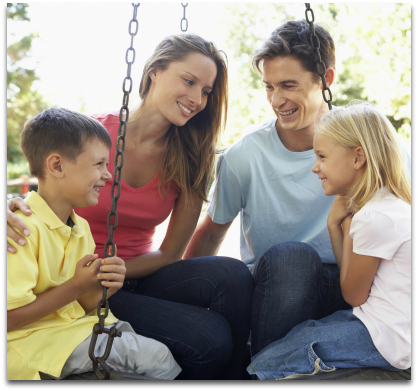 There is no greater teacher than the world around us, and our children are sponges, absorbing all of our actions and words as the blueprint for their lives.
There is no greater teacher than the world around us, and our children are sponges, absorbing all of our actions and words as the blueprint for their lives.
A lot of pressure? Maybe.
But that’s one of the beauties of parenthood – it pushes us to be our best selves.
I mentioned above that my brother and I never saw our parents disagreeing. How were we meant to learn how to disagree if we never saw it happening? It seemed to us that disagreeing was something so bad that it had be hidden, if it happened at all. But disagreements happen, and there’s no way to avoid them. What we can avoid is an inability to deal with conflict in a healthy manner.
For example, having a disagreement with your spouse is not a time to run to another room and argue in hushed tones. Instead, use it as a teaching moment for your child and for yourself.
Saying “when you forget to go to the grocery store, I feel disrespected” gets to the heart of the issue much more than angrily shouting “you’re so forgetful!”
It also helps your spouse recognize the impact of their actions on you – it is highly unlikely that he or she neglected to go to the store out of any disrespect for you – and it helps you recognize that you may be experiencing emotions that are more about your own reaction than about the actions of your partner. According to nonviolent communication pioneer Marshall Rosenberg, “what others do may be a stimulus of our feelings, but not the cause”.
Modeling this behavior is hugely instructional for our children. They get to see us being vulnerable, and they start to see this honest discussion of emotions as a normal and healthy part of our interactions with each other.
The 2-Minute Action Plan for Fine Parents
At the heart of teaching healthy conflict-resolution skills is a deep understanding of our own reactions to conflict. Just as we discussed helping your child recognize his or her emotions, we need to practice this ourselves.
The next time you disagree with your child, your spouse, your coworker, or your friend, notice how your body feels. Our bodies can often teach us a lot about our emotions. Do you hunch over, taking a protective stance out of a feeling of fear? Do you immediately cross your arms, unwilling to move forward hand-in-hand with the other person?
Identifying the tension in your body is the first step to letting it go. See if you can relax into your own vulnerability. Remind yourself that this is not a fight-or-flight situation, but rather an opportunity to understand each other more deeply and to forge an even stronger relationship.
The Ongoing Action Plan for Fine Parents
If you are inclined to write, you can take the 2-minute action plan a step further. Keeping a daily stream-of-consciousness journal can be a wonderful tool for unraveling our thoughts, feelings, actions, and the connections among the three.
Julia Cameron pioneered this idea in The Artist’s Way, calling the ritual “Morning Pages”. While it was originally meant to clear the mind to make room for creativity, the Morning Pages practice can also be used to clear your mind of any clutter or complicated thoughts, to make room for full, authentic engagement with the world and your family.
When it comes to conflict, a writing practice can help you understand your own reactions to difficult situations. This in turn helps us connect with and better understand our children. This high level of empathy is crucial for helping our children learn to understand their emotions related to conflict and disagreement, and one of the best ways to cultivate empathy is by being vulnerable ourselves. From that place of kindness and empathy, we can teach our children to deal with these moments in a way that fosters continued harmonious relationship at home, at school, and for the rest of their lives.
Your article started with a pleasant sounding story about going to a restaurant with your family. Yet, instead of enjoying your meal and conversation with others at the table you decided it would be a perfect time to rudely chastise and embarass your brother in front of his own parents and niece. It then upsets YOU that he stormed off. For the benefit of your ego and to further assassinate his character you go on to say this isn’t the first time he’s had a violent outburst of anger over a small conflict. Violent outburst? Since when is leaving a table after being humiliated by ones own family member considered violent? Have you always thought of yourself as the “Princess Daughter?” Have you always felt the need to scold and discipline your brother in public and in front of his parents? After reading your article in its entirety, I am positive that any “outbursts” your brother has had are a direct result of your behaviour. I hope he reads this.
I had a lot to learn about conflict (and I’m still learning). I am a natural-born peacekeeper. I go out of my way to avoid conflict, because I fear “breaking” the relationship. My father, on the other hand, sees conflict as a way of connecting, of deeply knowing each other. Realizing this has helped me see him in a different light, and has given me courage to speak up when I see things differently from him. It’s transformed our relationship.
That’s interesting, Amy! I had not thought of how things would be if one person would try to avoid the conflict and the other tries to face it head on. Anyway, so happy to hear about your improved relationship with your father. I think as we grow older and we watch our parents age, perspectives tend to change a little too, which will likely make it even easier to connect and relate. Wish you the very best!
This is really interesting, because my parents never fought, but I never got the feeling they were hiding it, I just got the sense that they simply got along. I think my brothers and I are all pretty good at finding calm solutions to disagreements and none of us are comfortable with crazy emotional drama. I think it’s served me well to have my first instinct to be to deescalate angry situations, but I don’t think of myself as avoiding conflict, just the drama.
My husband was raised by a single mom and never felt it was safe to fight with her because she was all he had. His instinct is more passive-aggressive, so that’s been something I’ve had to figure out how to handle over the years. But for the most part we get along and I don’t think we’ve ever had what anyone would classify as a fight, and certainly not since we had kids. We don’t always agree, but both of us are quick to concede to whomever the issue means more to.
My kids will just have to learn what they can from how we give each other distance or support when one or both of us is grumpy from time to time. What I learned from my upbringing is to expect my home environment to feel safe and nurturing. I want my kids to accept nothing less.
Thank you so much for sharing your experience. I find it really interesting the different dynamics that evolve in different relationships. Being adaptable to each other’s communication style is so important. Thank you for reading!
You are one of the fortunate ones, Korinthia 🙂 Maybe the way your parents did not fight was a way of modeling peaceful / healthy conflict resolution in of itself?
I don’t know how things work out when parents don’t fight, but I do know that when parents have conflicts that routinely escalate to high drama, children are affected to a certain extent. That said, all 3 of us sisters dealt with it differently, and somehow over time, we have all managed to find ways to resolve conflicts without too much drama in our own families now. It took me a while getting here, and I suspect it may have been the case for my sisters as well, but we are all in rather peaceful places right now (knock on wood). To me, like Tiffany mentioned, the biggest shift occurred with the realization that just because a person does not agree with you at the moment does not mean that that do not agree with you all the time, or don’t love you anymore. This is one of those things that I really hope I can make my daughter see…
Dinner at our table when I was a kid usually involved discussing interesting issues (usually ethical dilemmas, such as “If you own something can you do whatever you want with it?” inspired by a man in the news who said he wanted to be buried with an important painting he bought), and one of my brothers ALWAYS played devil’s advocate because all sides needed to be voiced. So there was never any real fighting, but always spirited discussions, so I suppose we learned early not to equate disagreement with disrespect. Maybe that’s enough?
Gosh, are you (and your family) for REAL? Please tell me you got that from a sitcom and not real, REAL life that you lived!!!
Yes. I definitely think that counts and would be more than just enough 🙂
PS: I can tell you counter stories where families (related to me) haven’t spoken to each other for years over much less than what one thinks one can do with what one owned (or thought one owned) 🙂
Ha, well I’m not pretending my family was perfect because there are always things to deal with, but most of my problems I brought on myself, and I can’t blame my parents. I always knew I was very lucky to grow up in the family I did, but didn’t really understand how rare a thing that was until I got to college and discovered how many people came from really complicated environments. I used to complain about things like how we HAD to be home for my mom’s home-cooked meals, until I moved out and realized, hey, that was actually incredible and I was just being a shnook.
(But my brothers are funnier than any sitcom. Wish you could meet them!)
I am one of 3 sisters, and while we love each other to bits, “brothers” have always been a source of wistful intrigue. And funny brothers who love playing the devil’s advocate without ruffling feathers and whom you talk about so adoringly…. now, that calls for a *long dramatic starry eyed sigh*
I think our kids feel so much pressure to succeed and be Facebook perfect that they just crumble with any criticism and then lash out rather than listen and grow. I love how you remind us to train our children that correction of a behavior isn’t a rejection of them as a person.
Yes! Understanding that distinction is crucial. I see this in adults all the time, too. It can be really difficult to not take feedback/criticism personally, so it is definitely important to start discussing this early. Thank you for reading!
Great read! I saw my children AND my adult siblings on this page. Interestingly, we were raised by a single mother (who never saw her own parents fight) and while she modeled much of this in her parenting, I realize we may not have had the opportunity to watch adults fight and still live each other. Actually, we remember fights and then divorce (which was the right thing) but may not have given us the opportunity to see these skills in action. Also – clicked through to your page, and LOVE your business. My while life would be different if we had this in CLE ten years ago!
Thank you for reading, Pam! And thank you for your comment about nido. I love hearing this from people – I am so grateful for the opportunity to do work that has such an impact on families (and I wish something like nido could have been available to you! everyone should have this opportunity!).